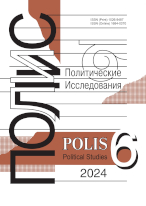Politics of France for obtaining European strategic autonomy in outer-space exploration
Klinova M.V.,
Doctor of Economics, Institute for International Studies (IIS), MGIMO University; Primakov National Research Institute of World Economy and International Relations (IMEMO), Russian Academy of Sciences, Moscow, Russia, marina.v.klinova@gmail.com
elibrary_id: 504473 | ORCID: 0000-0002-8548-9356 | RESEARCHER_ID: L-323-2017
Nikitin A.I.,
MGIMO University; Primakov National Research Institute of World Economy and International Relations (IMEMO), Russian Academy of Sciences; HSE University, Moscow, Russia, an@inno.mgimo.ru
elibrary_id: 637132 | ORCID: 0000-0003-3509-6893 | RESEARCHER_ID: O-6521-2015
Article received: 2023.08.20. Accepted: 2023.12.11

DOI: 10.17976/jpps/2024.02.12
EDN: UWVODI
Klinova M.V., Nikitin A.I. Politics of France for obtaining European strategic autonomy in outer-space exploration. – Polis. Political Studies. 2024. No. 2. https://doi.org/10.17976/jpps/2024.02.12. EDN: UWVODI (In Russ.)
The article was prepared in the framework of a research grant funded by the Ministry of Science and Higher Education of the Russian Federation (grant ID: 075-15-2022-327).
The development of such an immense strategic domain as an outer-space is based upon two pillars – civil and military. Space is a subject of competition between the most influential world powers, with the participation of state and inter-state structures, as well as private companies. Areas of panEuropean cooperation in the space sector are analyzed, including the participation of France and the EU and ESA, and the key and in some cases the leading role of France in these processes. The geopolitical significance of the outer-space in global competition and the evolution of the position of European powers and specifically of France in relation to the military component of space exploration are studied. Outer-space and cyber-space now are interpreted in Western military strategies as the fourth and the fifth “domains” of military operations, together with land-, sea- and air-domains. Western powers are coordinating and integrating their military-space activities. France and the governing structures of the European Union place an emphasis on assuring the strategic independence of Europe from the USA and from the technologies of “third countries” in space exploration, the military exploration of space included. The EU pays great attention to the formation and development of the “space economy” and the links between the state space programs with the private sector and private investments. The outer- space in the third decade of the XXI century has become a domain of everyday and constant activities of “space powers”, and because of the role of space technologies in the areas of communications, internet and cell communications, geo-positioning, TV-broadcasting, etc. widely interfere in the life of all other states on the planet. The militarization of the outer-space in different formats is actively progressing and requires active political efforts to ensure its peaceful use.
References
Augier, J. (2018). MATRA: origine et fondateurs. Toulouse.
Gallois, P.-M. (1985). La guerre de cent secondes: Les Etats-Unis, l’Europe et la guerre des Etoiles. Paris: Fayard.
Henbest, N. (1993). The Satellite era. The UNESCO Courier, Jan., 10-14.
Klein, J. (2001). La France et la defense antimissile. Politique etrangere, 66(4), 827-846. https://doi.org/10.3406/polit.2001.5126
Krige, J. (1992). The Prehistory of ESRO 1959/60. From the First Initiatives to the Formation of the COPERSI. Noordwijk. European Space Agency.
Lefebvre, J.-L. (2016). Strategic spatiale. Paris: ISTE.
Moulin, H. (2006). La France dans l’Espace 1959-1979. Contribution d l’effort spatial europden. Noordwijk (Pays-Bas).
Pascallon, P., & Dumoulin, A. (dir.). (2009). Quelle politique de securite et de defense pour l’Europe? Paris: L’Harmattan.
Ramecourt, M. de. (2019). Services en orbites: une activite commerciale ddstabilisatrice? Nemrod-ECDS (Enjeux Contemporains de Defense et de Securite). https://nemrod-ecds.com/?p=4898
Arbatov, A.G. (2023). Nuclear metamorphoses. Polis. Political Studies, 5, 7-28. (In Russ.) https://doi.org/10.17976/jpps/2023.05.02
Arbatov, A.G., & Dvorkin, V.Z. (Ed.). (2009). Kosmos: oruzhie, diplomatiya, bezopasnost [Outer space: weapons, diplomacy and security]. Moscow: ROSSPEN. (In Russ.)
Arbatova, N.K. (2019). Strategic Autonomy of the European Union: reality or good intention? Polis. Political Studies, 6, 36-52. (In Russ.). https://doi.org/10.17976/jpps/2019.06.04
Baranovsky, V.G., Buzhinsky, E.P., Zagorsky, A.V., Nikitin, A.I., & Oznobishchev, S.K. (2022). Avoiding nuclear war. Problems of escalation/de-escalation of armed conflicts when approaching the “nuclear threshold”. Polis. Political Studies, 6, 114-134. (In Russ.) https://doi.org/10.17976/jpps/2022.06.09
Bogdanov, K.V., & Stefanovich, D.V. (2022). Global missile proliferation: challenges and solutions. Social Sciences and Contemporary World, 2, 63-77. (In Russ.). https://doi.org/10.31857/S0869049922020058
Klinova, M.V. (2011). Gosudarstvo i chastnyj kapital: ot teorii k praktike vzaimodejstviya v evropejskih stranah [State and private capital: from theory to practice of interaction in European countries]. Moscow: Magister Publishers. (In Russ.)
Oznobishchev, S.K., Topychkanov, P.V. (2012). Development of “Regional” Missile Potentials and Anti-Missile Systems. World Economy and International Relations, 12, 24-32. (In Russ.). https://doi.org/10.20542/0131-2227-2012-12-24-32
Petrunin, S.V. (1978). Sovetsko-francuzskoe sotrudnichestvo v kosmose [Soviet-French cooperation in space]. Moscow: Znanye. (In Russ.)
Sidorov, A.S. (2010). EU on the way to common defense policy. World Economy and International Relations, 12, 99-110. (In Russ.)Sidorov, A.S. (2023). Voenno-politicheskoe izmerenie evropejskoj integracii: poziciya Francii (ot de Gollya do nashih dnej) [The military-political dimension of European integration: position of France (from Charles de Gaulle up to nowadays]. Moscow: INION RAN. (In Russ.)
Stefanovich, D.V., & Porras, D. (2022). Space as a competition domain: threats and opportunities. Journal of International Analytics, 13(2), 95-106. (In Russ.)
Voronina, A.S. (2012). UN Committee on Space at the present stage: achievements, problems, challenges. Law and Politics, 5, 917-933. (In Russ.)
Yakovenko, A.V. (2002). Kosmicheskie proekty. Mezhdunarodno-pravovye problem [Space projects. International legal issues]. Moscow: Nauchnaya kniga. (In Russ.)
See also:
Arbatova N.K.,
The versatile triangle: EU relations with the USA and China. – Polis. Political Studies. 2023. No6
Arbatova N.K.,
EU Security: Micro-Aggression with Macro-Consequences. – Polis. Political Studies. 2021. No5
Oznobishchev S.K.,
The new world and Russia NATO relations. – Polis. Political Studies. 2011. No3
Arbatova N.K.,
Relations of the European Union with the United States and NATO: dilemmas of euro-atlanticism. – Polis. Political Studies. 2024. No4
Alekseyeva T.A.,
Strategic culture: evolution of the concept. – Polis. Political Studies. 2012. No5





.jpg)






 print
print
.jpg)
.jpg)